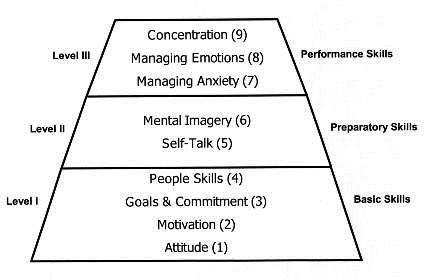Overview of Psychological Skills Training
Psychological Skills Training (PST) has long been a neglected aspect of many sports. This may be due to a lack of understanding of the value of these skills or a lack of certainty around the implementation of PST. There are also many myths around psychological skills; they are only reserved for problem athletes, they take too long to learn therefore neglecting regular practice or that they are simply not useful.
So, what is PST and why are psychological skills so important? According to Weinberg & Gould (2003), “psychological skills training refers to the systematic and consistent practice of mental or psychological skills for the purpose of enhancing performance, increasing enjoyment, or achieving greater self-satisfaction.”
The definition of PST must also be considered in concurrence with a definition of success, which according to Wooden (1966) is “peace of mind that is the direct result of self-satisfaction in knowing you did your best to become the best that you are capable of becoming.”
Performance Enhancing Psychological Skills
Different terms are used for different components of PST. While it is good to be aware of these differences, the dynamic interaction between techniques, skills, and qualities can make it difficult to target any one component in isolation from others.
However, in terms of developing the athlete’s range of skills and qualities, we can divide psychological skills into different categories. This helps to outline what skills are required as foundational for others to be developed and provides guidelines for identifying athlete needs.
There are three levels of skills with a total of nine primary skills that are necessary for performing well in sport and non-sport performance situations. Lesyk (1998), at the Ohio Centre for Sport Psychology, states:
- These skills are learned and can be improved through instruction and practice.
- Work with each individual should begin by assessing current proficiency in each of the skills.
- A plan should be developed for the teaching and enhancement of the specific skills that need improvement.
- Periodically reassess the client’s proficiency in each of the skills to evaluate progress.
The Psychological Skills Training Pyramid

Level 1 – Basic Skills
These mental skills constitute a broad base for attaining long-term goals, learning, and sustaining daily practice. They are needed on a day-by-day basis for long periods of time, often months and years. The four basic skills in the PST pyramid are outlined below.
- Attitude: Attitude is a choice and successful athletes choose an attitude that is predominantly positive. They pursue excellence, not perfection and view their sport as an opportunity to compete against themselves and learn from their successes and failures. These athletes maintain balance and perspective between their sport and the rest of their lives.
- Motivation: The skill of motivation helps athletes to persist through difficult tasks and difficult times, even when these rewards and benefits are not immediately forthcoming. These athletes are also aware of the rewards and benefits that they expect to experience through their sports and also realise that many of the benefits come from their participation, not the outcome.
- Goals and Commitment: Setting long-term and short-term goals that are realistic, measurable and time-oriented is a key trait of high-performing athletes. They are aware of their current performance levels and can develop specific, detailed plans for attaining their goals. They are highly committed to their goals and to carrying out the daily demands of their training programs.
- Social: Successful athletes realise that they are part of a larger system that includes their families, friends, teammates, coaches, and others. When appropriate, communicate their thoughts, feelings, and needs to these people and listen to them as well. Have learned effective skills for dealing with conflict, difficult opponents, and other people when they are negative or oppositional.
Level 2 – Preparatory Skills: These skills are used immediately before performance to prepare for performance. They may be used just before competition begins, or immediately before a specific performance action, such as a golf shot or a free throw in basketball.
- Self-Talk: Maintaining self-confidence during challenging times with realistic, positive self-talk and use self-talk to regulate thoughts, feelings and behaviours during competition is vital for athletes.
- Mental Imagery: Mental imagery is a skill utilised by athletes to prepare for competition by imagining themselves performing well in competition, creating, and using mental images that are detailed, specific, and realistic. This skill can also be important during competition to prepare for action and recover from errors and poor performances.
Level 3 – Performance Skills: These skills are used during actual performance behaviour. The pyramid above represents the relationship of the nine skills to one another. Each of the higher levels incorporates and is based upon the skills of the preceding levels.
- Anxiety Management: Anxiety is part of sport and elite athletes understand that some degree of anxiety can help them perform well. They also know how to reduce anxiety when it becomes too strong, without losing their intensity.
- Emotional Management: Strong emotions such as excitement, anger, and disappointment are part of the sport experience. It is important for athletes to use these emotions to improve, rather than interfere with high level performance
- Concentration: Successful athletes have learned how to maintain focus and resist distractions, whether they come from the environment or from within themselves. They have learned how to play in the “here-and-now”, without regard to either past or anticipated future events. They are also able to regain their focus when concentration is lost during competition.
Here, we have outlined the key skills within the Psychological Skills Pyramid and how they are demonstrated and utilised by athletes in a sports setting. In our next piece, we will look at how some of these mental skills can be integrated into training by athletes.


Leave A Comment